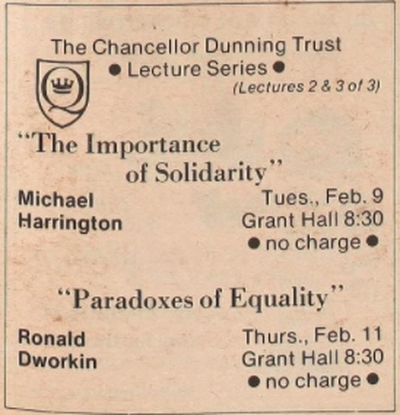
Ronald Dworkin was a widely-respected philosopher of law. At the time of his talk, Dworkin was the professor of jurisprudence at Oxford. In his research and teaching, he examined how the law should deal with race, abortion, euthanasia and equality in ways that were accessible to lay readers. He wrote a number of books, including the influential Taking Rights Seriously (1977), which called for a rights-based theory of law. His other books include A Matter of Principle, Law’s Empire, and Justice in Robes. His 2011 essay “Justice for Hedgehogs” expanded on his view that the legal system was a branch of morality, calling for a moral system centered around human dignity. He died in 2013.
In a counterpoint to Amartya Sen’s lecture on “The Paradoxes of Liberty,” Dworkin considered the essential question about how to define equality. Humans, he suggested, could not be equal in both available resources and in their level of happiness or welfare. Political equality should therefore aim to equalize the resources available to individuals rather than making everyone equally satisfied or happy. From here, the key became deciding “what differences among people ought to make a difference once we’ve decided that some differences ought not to make a difference.” For example, he asked, should an individual with great ambitions receive the same resources to pursue them as someone with little ambition? Different ambitions, but not different circumstances, should affect the distribution of resources. To illustrate this more concretely, Dworkin suggested that our vision of equality in private property should aim for results similar to what would happen under an ideal auction system, in which given equal chips, all the goods of society were distributed between people based on their willingness to bid on them. However, this was more difficult to apply to the question of political equality, rather than equality in private property. He ultimately advocated for a mixed and flexible definition of equality that balanced inputs and outputs on an individual basis, and allowed for a variety of contexts.
Listen to his lecture below.